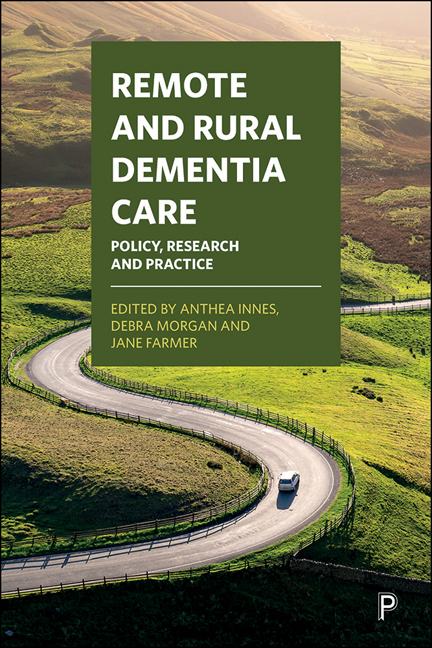12 - Living with Dementia in Rural Ireland
Published online by Cambridge University Press: 10 March 2021
Summary
Introduction
They say it takes a village to raise a child. I think it takes a village (or in my case a town) to support a person living with dementia. My town is called Tubbercurry; the town and its hinterland comprise approximately 5,000 people. We are 37 km from the nearest hospital; however, some of our medical centres of excellence are in Galway. That is where my consultant doctor is located and it is 105 km from where I live.
Living in rural Ireland my town is of critical importance. The people, the place and the feeling when walking in the beautiful Sligo countryside have a huge impact on my wellbeing.
I was born in the middle of the Ox Mountains, in Lough Talt, Tubbercurry, County Sligo in 1950. We were a traditional Irish family. I was one of nine; my brothers and sisters were my first ‘town’.
I emigrated like many others in rural Ireland to the United States, and I had a wonderful career in Ohio and Kentucky. While home on holidays I met my husband in Tubbercurry. We wrote and telephoned – no emails then!
After getting married in 1982 in Cincinnati, we moved to the UK where my husband Sean worked and I embarked on a new career. Four years later, our son Martin arrived and thoughts turned to returning home. In 1994, we settled in Tubbercurry and Martin found 40 cousins on his first day at school!
Coming home was a great decision for all of us. I think our life was like any family; there was hard work in our café and bed and breakfast business, ups and downs, and health difficulties, but we were happy. I became an activist locally, joining committees and taking an active part in welcoming refugee families to Tubbercurry.
Age 52, I returned to university to study community development, and this led me to working in the disability sector. I was President of the Chamber of Commerce, and Chair of a state agency – very unique for a woman in Ireland at that time. I was living a life of my choosing, in a rural part of Ireland, that was fulfilling.
- Type
- Chapter
- Information
- Remote and Rural Dementia CarePolicy, Research and Practice, pp. 267 - 278Publisher: Bristol University PressPrint publication year: 2020



